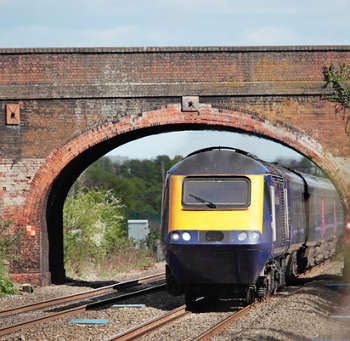Ministers have been forced to put several major rail electification projects on hold in the face of escalating costs and criticism from the National Audit Office (NAO) that the work was ‘a case study in how not to manage a major programme’.
In a statement to Parliament, rail minister Paul Maynard said he had decided to defer four electrification projects as a result of ‘the ongoing assessment of investment decisions’ that followed the Hendy Review.

A Great Western train on a non-electric section
The 4 projects being deferred are:
- electrification between Oxford and Didcot Parkway
- electrification of Filton Bank (Bristol Parkway to Bristol Temple Meads)
- electrification west of Thingley Junction (Bath Spa to Bristol Temple Meads)
- electrification of Thames Valley Branches (Henley & Windsor)
This is not the first time Network Rail's electrification works have come unstuck. Last year, the then rail minister, Claire Perry, ‘paused’ electrification projects in the Midlands and the North after poor project delivery by Network Rail, leading to the Hendy Review in November 2015, which saw significant cutbacks to the modernisation programme.
The review identified a £2.5bn black hole in Network Rail finances, which would be filled with a £1.8bn sale of assets and £700m of potential extra borrowing. Transport Network recently revealed that Network Rail was still considering options on its asset fire sale almost a year later.
Mr Maynard stated that the latest electrification delays had been made because the Government could bring in newer trains with more capacity ‘without requiring costly and disruptive electrification works’.
According to the NAO, the DfT intends to electrify the four sections during the next rail investment period, from 2019 to 2024. The move shifts between £146m to £165m to other projects within the Great Western electrification programme.
Also on Tuesday (8 November) the NAO published a highly critical report into the programme to modernise the route from London to south west England and South Wales, which highlighted an increase in the estimated cost of £2.1bn to £5.58bn since 2013.
It said delays to the electrification programme will cost the Department for Transport (DfT) up to £330m. The NAO made clear that the DfT ‘has delayed electrification on some stretches of the route as the costs cannot be met within the funding package’.
The NAO also noted that following delays, the DfT had varied its order for Intercity Express trains so that they can operate under both diesel and electric power.
Sir Amyas Morse, head of the NAO, said ‘The modernisation of the route has potential to deliver significant benefits for passengers but this is a case study in how not to manage a major programme.
‘The Department's failure to plan and manage all the projects which now make up the Great Western Route Modernisation industry programme in a sufficiently joined up way, combined with weaknesses in Network Rail's management of the infrastructure programme, has led to additional costs for the taxpayer.’
Stephen Joseph, chief executive of Campaign for Better Transport, said: ‘The Government should set out how and when services on the lines affected are now going to be improved to cope with growing demand.
‘More generally, passengers need reassurance from the Government and Network Rail that there are no more skeletons in the closet and that budgeting is genuinely now under control.’
Register now for full access
Register just once to get unrestricted, real-time coverage of the issues and challenges facing UK transport and highways engineers.
Full website content includes the latest news, exclusive commentary from leading industry figures and detailed topical analysis of the highways, transportation, environment and place-shaping sectors.
Use the link below to register your details for full, free access.
Already a registered? Login